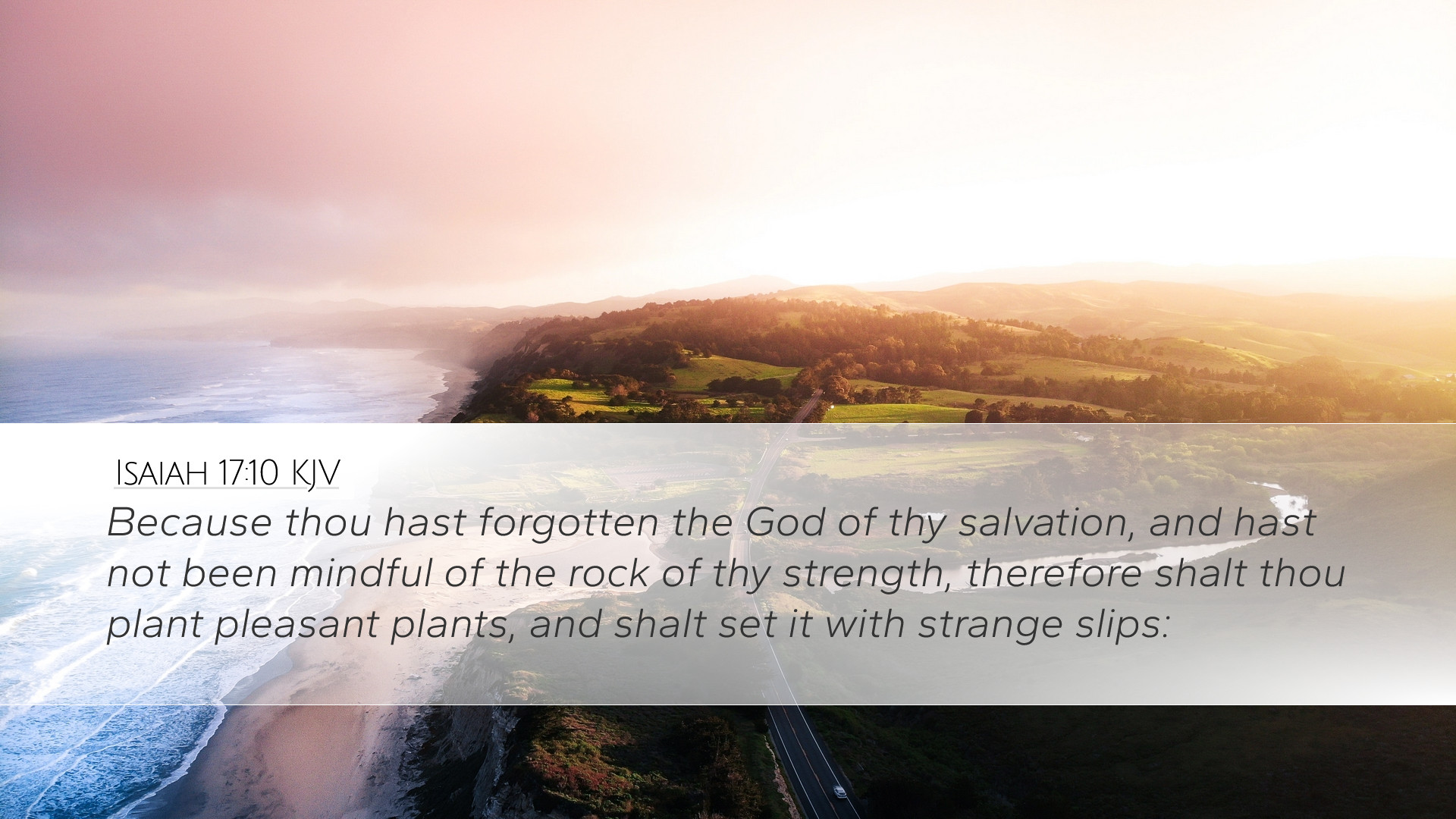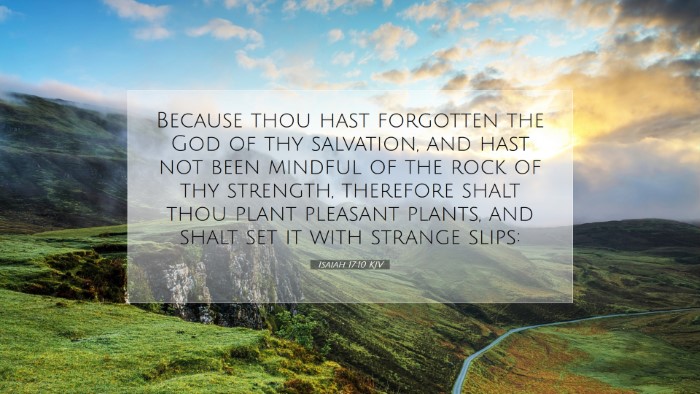Commentary on Isaiah 17:10
Isaiah 17:10 states, "For you have forgotten the God of your salvation, and you have not been mindful of the rock of your stronghold; therefore you will plant pleasant plants and set out foreign seedlings." This verse serves as a profound reflection on the state of Israel's spiritual and moral condition leading to impending judgment.
Contextual Background
To fully grasp the implications of this verse, we must consider its context within the Book of Isaiah. The prophet Isaiah delivers messages of warning, judgment, and hope during a tumultuous period in Israel's history when the nation faced external threats and internal moral decay.
Historical Setting
Isaiah ministered during the 8th century B.C. when Israel was divided into the northern and southern kingdoms. The northern kingdom, Israel, was marked by idolatry and a departure from the worship of Yahweh. This backdrop is essential in understanding the admonition in Isaiah 17:10.
Thematic Analysis
This verse embodies several themes critical for theological reflection:
- Forgetting God: The act of forgetting God signifies a deliberate choice to neglect one's covenant relationship with Him. Citing Matthew Henry, forgetting God is an indication that Israel relied on themselves rather than divine guidance.
- The Rock of Salvation: God is referred to as the "rock" in Scripture, symbolizing strength, reliability, and security. In this context, the "rock of your stronghold" represents the foundation upon which Israel's hope should rest.
- False Security: The mention of planting pleasant plants and foreign seedlings illustrates an attempt to create security and prosperity outside of reliance on God. Albert Barnes warns that such practices denote a misplaced faith in human endeavors rather than divine provision.
Commentaries Insights
Matthew Henry's Commentary
Henry delves into the spiritual lethargy that led Israel to forget their Deliverer. He notes, "When we turn away from God, we inevitably turn to the idols of our own making." He highlights that prosperity distant from rightful worship becomes a snare instead of a blessing. This deceitful security prompts Israel to focus on external appearances rather than genuine dependence on God's grace.
Albert Barnes' Commentary
Barnes emphasizes the significance of remembering the God of salvation. He states, "When men rest in their own strength, they forsake their only true defense." The planting of foreign seedlings symbolizes the dangers of adopting foreign practices—both in agriculture and spirituality—leading to a corruption of one's foundational beliefs. Furthermore, Barnes sees a direct connection between one's condition of heart and the outcomes experienced in life, urging deep introspection about the roots of one's faith.
Adam Clarke's Commentary
Clarke points out the irony in attempting to cultivate success and prosperity while failing to acknowledge God. He remarks, "The forgetfulness of God leads to an insatiable thirst for worldly pleasures that bring only fleeting satisfaction." He encourages readers to reflect on the perilous consequences of abandoning God for the allure of worldly success, asserting that true contentment can only be found in a relationship with the Creator.
Theological Implications
This verse offers significant theological insights that resonate even today:
- The Danger of Neglect: The neglect of spiritual matters often opens the door to moral decline. This serves as a cautionary tale for modern believers to prioritize their relationship with God above all else.
- The Urgency of Remembrance: Remembering God in every aspect of life fortifies one's spiritual foundation. As emphasized by Henry, through remembrance, believers acknowledge their complete dependence on God for both physical and spiritual sustenance.
- Idolatry of Self-Reliance: Reliance on one's understanding can lead to spiritual blindness. This invites reflection on modern practices that may inadvertently lead believers astray.
Application for Today's Believers
The admonition of Isaiah 17:10 is highly applicable for today's Christians:
- Personal Reflection: Individuals and churches should engage in self-examination regarding their reliance on God. Are there areas where they have forgotten the God of their salvation?
- Cultivating Spiritual Growth: Instead of focusing solely on worldly success and appearances, believers are encouraged to cultivate their relationship with God, leading to genuine spiritual fruitfulness.
- Community Awareness: Churches may need to address collective forgetfulness of God's role in their ministries and missions, reinforcing the centrality of prayer and dependence on God’s guidance and wisdom.
Conclusion
Isaiah 17:10 serves as a solemn reminder of the importance of remembrance and reliance on God for salvation and stability. As noted by the commentaries of Henry, Barnes, and Clarke, the forgetfulness of God can lead to a decline in spiritual and moral integrity. The acknowledgment of God as the source of strength not only resonates in the historical context of Israel but also rings true for contemporary believers. It calls for a recommitment to the Rock of our salvation, ensuring that our foundations remain steadfast in an ever-changing world.


